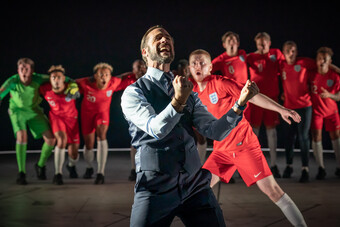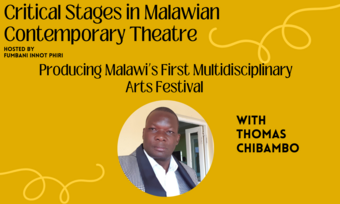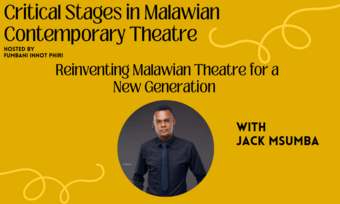Chupacabras and Risk in TYA
There came a time when the risk to remain tight in the bud was more painful than the risk it took to blossom.
—Anais Nin
I have an imaginary goat named Valencia who loves Payday candy bars, speaks Spanish, English (and goat) and is terrified of chupacabras. Just in case you don’t know, a chupacabra is a maybe mythical / maybe-not-so mythical creature known for sucking the blood of goats. Yes, a goat vampire. They were one of the discoveries I made at the Kennedy Center’s New Visions/New Voices Festival while work-shopping my play The Transition of Doodle Pequeño alongside director, Wendy Bable from People’s Light & Theatre.
Doodle takes place on Halloween and tells the story of two fifth grade boys who become friends because of their differences. With the help of Valencia, the play examines a few complex subjects; among them gender-identity, homophobic bullying and immigration. Doodle marks my first original TYA script. Coming to New Visions/New Voices, I was terrified at the prospect of showing my sassy little goat and her human friends to scholars and the gatekeepers of TYA theatres across the country. Why? Though it pains me to say it, given its subject matter, with Doodle, I feared that I might be called out for writing a play that was “inappropriate” for children.
To be clear, I’ve personally never believed that the subject matter of Doodle is inappropriate. But despite my personal convictions, I almost shelved the play several times during the process because #1: writing TYA is hard and #2: I thought it would be a futile effort. I thought no theatre would ever touch a play that seeks to create a conversation about the word “gay” with eight to twelve year olds. To borrow from George Carlin, we live in a time of “child worship…which is a sophisticated form of child abuse.” We’re more protective of children than ever. We sanitize the “child” out of children, fearing they can’t handle deeper, darker, grittier half-truths and grey areas. Our child worship coupled with deeply embedded religious beliefs paralyze discussions about gender and sexuality with kids in our country. The closet is still a very dark place for most American kids. Thus, we have rampant homophobic bullying, intolerance and denial of identity. So, isn’t it up to us, the adults, to begin the conversation with our children? To unpack the complex and colorful world we live in from every angle? To deeply examine language and its ability to free or destroy another human being? Or do we shortsightedly think that kids are incapable of handling the truth? Generally, I don’t believe kids have problems wrestling with complexity. Adults do.
Fundamentally, I believe we all want to be moved, to be shaken to our core, to be reminded of who we were, who we are and who we might turn out to be. Whether we’re five or ninety-five.
However, I’m happy to report that was not the case with most of the adults in the room at New Visions/New Voices this year. Not only was Doodle met with enthusiasm by the majority, but more importantly, I found an international community of playwrights and theatremakers who are wholeheartedly taking the risk to tell challenging, gritty, revolutionary, spiritually stirring stories for children. I was introduced to fearless TYA voices like Australian writer, Finegan Kruckemeyer, whose play The Boy at the Edge of Everything brimmed with stunning and intricate language and massive philosophical ideas about the expansion of the universe and our place within it. I was moved to tears by German writer Martin Baltscheit’s Only a Day, which through the single-day life cycle of a Mayfly is a piece that simply, elegantly and comically examined death and living in spite of it.
Despite shrinking arts budgets and the trend to shield children from complicated truths, to my delight, I found that risk is alive and well in the field of TYA. On several occasions, during feedback sessions, teams were even encouraged to push their material further. But, there were also a few disheartening conversations and remarks from producers that demonstrated a fear of challenging material for children. Their worries, like many theatres across our country, were based on simple economics and backlash from boards. While risk was embraced and encouraged during this development conference, the sad reality is that risky, dark, complicated material is problematic for TYA producers. Is it too naïve to suggest that it is indeed the risk that makes it important?
At New Visions/New Voices, my goat and I felt like the new kids being welcomed to the neighborhood. TYA is an arena where I can write plays that question American norms, stories that deeply examine otherness. I hope to be a long-term resident of this neighborhood and to continue to write plays that scare me, that always move toward what I do not know. As an audience member and as a writer, I seek transformative theatre. I crave work that gets under my skin and gnaws at my bones, pieces that ache and astonish me long after I’ve left the theatre. In many ways, I believe theatre is a forum for debate. I believe theatre’s a place we go to experience catharsis, to practice our humanity and to question our identity. Fundamentally, I believe we all want to be moved, to be shaken to our core, to be reminded of who we were, who we are and who we might turn out to be. Whether we’re five or ninety-five.









Comments
The article is just the start of the conversation—we want to know what you think about this subject, too! HowlRound is a space for knowledge-sharing, and we welcome spirited, thoughtful, and on-topic dialogue. Find our full comments policy here
I was at the conference and I loved your play because it handled all of the "hot" topics with such sensitivity and weaved all of them in a graceful way. The dialogue was very realistic, the characters were believable and it had lots of heart. Bravo!
I do believe that most principals would not want to offer your play as a field trip and bring it to their schools for a general assembly. But that being said, I would not hesitate to produce it at my theater in Jacksonville, Fl as I know that many teachers and parents would appreciate the door being open on these topics and would want to use your play as a jumping off point for discussion. We need to speak to the kids that are Not being brain washed. We need to reach out to those children who know something is happening every day in their schools, on their buses and in their neighborhoods and they don't know how to help. Good luck with the piece.
I was excited to read your op-ed about YA literature/theater. I agree that fear is one of the main reasons much YA material is never produced. The irony of that as someone has said is that children already know more about life than we baby boomers ever will. It, in fact, scares me sometimes to realize how savvy they are at younger and younger ages. Although I didn't see or read your play, I'm familiar with the man who wrote it, and I'm sure it goes right to the heart of the goat. I hope Doodles makes a big impact in theater where it is produced. You make me proud to have been a part of your earliest experience with theater.
I experienced the reading of your play on Saturday at New Visions/New Voices, and it was a highlight for me. I loved the play, and I hope that it many productions. Congrats on a fantastic piece of theatre!
Wende posted a link to this on FB and I'm glad she did! Congrats to a fellow Chatsworth boy!
When you are ready to share the script, please sned me a copy at Cincinnati Playhouse in the Park.
thanks
I have nothing to do with their play selection process, and maybe they'll kill me for mentioning them, but all of you with these important, meaty, real TYA shows should investigate The Coterie Theatre in Kansas City—they do excellent productions of a wide range of youth-focused shows for a range of ages, including teens, and I've seen them handle some of the so-called tougher material. They never dumb anything down, and they are where I'd go if I were shopping a piece like yours. I hope I'll see them—they sound heaven-sent.
It is strange. Think of classic movies for children from the Wizard of Oz (frankly terrifying), The Sound of Music (Nazis), Bambi (kabam to Mom), every other movie with a dead mom and/or dad (too many to list). And then there's TYA, where nothing bad can happen unless the play is based on an already popular book or is already one of those classics. Meanwhile, my 6-year old demands to know about war, terrorism, and how the guillotine works, exactly. I'm writing a rather spooky TYA myself, and holding out hope for a brave producer!
Writing on the edge...for the edge. You write wisely. Kudos
"I crave work that gets under my skin and gnaws at my bones, pieces that ache and astonish me long after I’ve left the theater."
- Man kann es nicht besser sagen!
You can not say it better!!
That is what writing, art and living is about.
Thank you.
Nick--kudos on that terrific piece. I wish I were in the producing business so I could give Only a Day many days. It was a great week.
I directed One Day at a Time, and I'm sorry I didn't get to see your piece. But your comments are so trenchant -- yes. We need to do theatre that addresses what the audience actually experiences. Today's child knows more about war, death, disease, diversity, difference, conflict, joy, discovery, surprise and ...well, life... than those of use brought up in the sanitized 1950s will ever understand. The art we give them must reflect the reality of their world, not the Disneyfied perception of some ideal childhood. I wish I'd seen your piece. I will look for it.
As a theatergoer and former critic, I love what you have to say. As a parent, I love it even more. Children are complicated, curious, sometimes dark creatures -- oh right! they're human! -- and they crave art that feeds their spirits at least as much as adults do. Sometimes the adults just need to get out of the way.